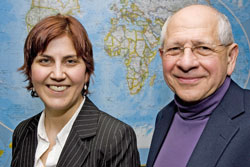Alumna here on way to new government post

Carol McQueen, here with Frank Chalk, sees hope in UN initiatives.
Photo by andrew dobrowolskyj
Rhodes Scholar Carol McQueen returned here to her alma mater last week with a message of hope from eastern Africa. After the grim speech by Paul Rusesabagina, the hero of Hotel Rwanda, and last November’s conference on the Darfur crisis, that was reassuring.
McQueen, one of the star pupils of the Liberal Arts College and genocide scholar Frank Chalk, has just returned from three years in the Democratic Republic of Congo (DRC), where she was a political officer with the United Nations Peacekeeping Mission.
In a seminar to Chalk’s graduate students and a public speech on Jan. 20, she explained why there is reason for optimism.
When we hear reports of violence against civilians from Côte d’Ivoire and Darfur, she said, “It’s easy to be negative. But it’s important to see how much progress we’ve made in 10 years.”
International opinion is inching towards a more nuanced definition of sovereignty. McQueen said the 1991 UN Security Council debate over the fate of the Kurds in Iraq was an uncomfortable one, with few members willing to entertain the idea of helping an oppressed minority to protect them from genocide or ethnic cleansing.
Moreover, experts in international law she consulted at the time were cautious, largely because there were few legal precedents for interference in a nation’s internal affairs.
That is starting to change. In 2004, a high-level UN panel endorsed the principle that every state has a responsibility for the protection of its own people; when a state cannot or will not protect its citizens from genocide or massive violations of human rights, its sovereignty yields to other states’ responsibility to protect them. The Security Council has not yet reached a formal consensus on this third-party use of force, McQueen admitted, but “at least they are talking about it.”
She has just published a book with British academic publishing house Palgrave MacMillan called Humanitarian Intervention and Safety Zones: Iraq, Bosnia and Rwanda. In it, she describes three international efforts to establish and maintain “safety zones” for beleaguered minorities within states — and why they failed.
Reading Lt.-Gen. (Ret’d) Dallaire’s account of his disastrous UN peacekeeping experience in his book, Shake Hands With the Devil, she noticed that he “seemed to be a one-man show,” having to conduct endless meetings as well as being military leader. That wouldn’t happen now. In the recent mission in DRC, McQueen was one of “between 100 and 300 civilian officers work to advance the political process, leaving the military free to address security threats.”
She said that for a peacekeeping mission to work, the mandate must be clear and robust, there must the be authority and the capacity to use force and there must be proper command and control mechanisms. All these conditions were present in the Congo mission, and she felt that although it wasn’t always smooth sailing, much bloodshed had been prevented.
One of her former colleagues in the UN mission, who had been a demobilization officer in DRC, was less sanguine. He said a strong, reliable, incorruptible police force and army are also essential, or demobilized soldiers will eventually drift into another lawless militia.
McQueen has just taken a post with the Department of Foreign Affairs in Ottawa as a member of a stabilization and reconstruction task force aimed at assisting failed and fragile states. Her talk at Concordia was sponsored by the Liberal Arts College and the Montreal Institute for Genocide Studies.